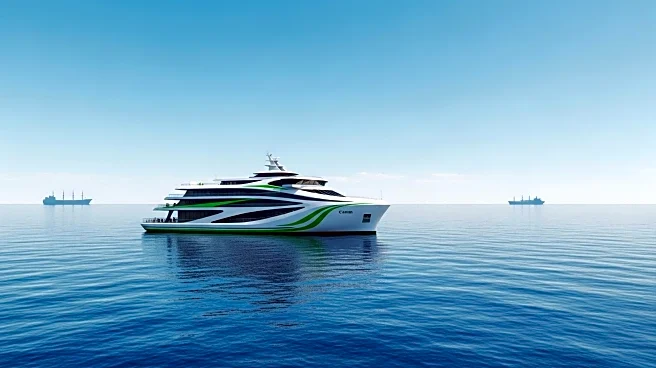What's Happening?
Oman has announced plans to construct the Middle East's first eco-friendly ship recycling facility, marking a significant advancement in sustainable maritime practices. The facility will be located in Khatmat Malakha, North Batinah, and is part of Oman's strategy to achieve zero emissions by 2050. The project will be executed in partnership with Green Wheel Recycling Middle East, with a concession agreement expected to be signed in September. The facility will dismantle and recycle over 70 ships annually, producing approximately 2 million tons of high-quality low-carbon steel in its initial phase. This initiative is designed to comply with strict environmental regulations, ensuring the safe and responsible dismantling of decommissioned ships. The project is anticipated to create around 2,000 direct and indirect jobs, boosting related industries.
Why It's Important?
The development of this eco-friendly ship recycling plant is a crucial step for Oman in addressing international regulatory pressures on shipping companies to adopt environmentally responsible recycling practices. By establishing this facility, Oman positions itself as a leader in sustainable maritime solutions in the region. The project not only supports Oman's broader sustainable development goals but also contributes to the global effort to reduce carbon emissions in the maritime industry. The production of low-carbon steel from recycled ships will help meet the growing demand for sustainable materials, potentially influencing market dynamics in the steel industry. Additionally, the creation of jobs and stimulation of related industries will have positive economic impacts on the region.
What's Next?
The next steps involve the signing of the concession agreement in September, which will initiate the construction phase of the project. As the facility becomes operational, it is expected to attract attention from international shipping companies seeking environmentally compliant recycling options. The success of this project could lead to further investments in similar sustainable initiatives within the region, potentially setting a precedent for other countries to follow. Stakeholders in the maritime and steel industries will likely monitor the project's progress closely, assessing its impact on regional and global markets.
Beyond the Headlines
This initiative highlights the growing importance of sustainable practices in traditionally high-impact industries like shipping and steel production. The project's focus on low-carbon steel production aligns with global trends towards decarbonization and could influence future regulatory frameworks. The integration of renewable energy solutions, as seen in the agreement between Vale and OQ Alternative Energy, underscores the potential for cross-industry collaborations to achieve sustainability goals. This development may also prompt discussions on the ethical responsibilities of industries to minimize environmental harm while maintaining economic viability.











